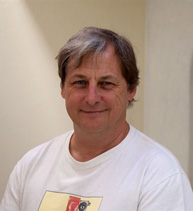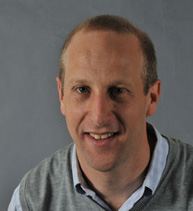Three hailed for their teaching
04 December 2012 | Story by NewsroomAs UCT continues to reflect on its teaching credentials, the annual Distinguished Teacher Awards (DTA) serve as a timely reminder that often the university gets it right.
 |
 |
 |
| Learning while teaching: The recipients of UCT's Distinguished Teacher Awards for 2012 are (from left) Prof John Higgins, Dr Jeremy Wanderer and Dr Zenda Woodman. | ||
As UCT continues to reflect on its teaching credentials, the annual Distinguished Teacher Awards (DTA) serve as a timely reminder that often the university gets it right.
Recently, the university celebrated, at the annual DTA dinner, the teaching of three academics: Professor John Higgins of the Department of English Literature, Dr Jeremy Wanderer of the Department of Philosophy, and Dr Zenda Woodman of the Department of Molecular and Cell Biology.
Each of the recipients brought something special to the lecture and tutorial room, it was pointed out. Higgins has been hailed as everything from "humorous" and "systematic" to "brilliant" by his students. Wanderer's students have credited him for helping them "think outside the box" or, starting with the basics, "how to think". And students working under the tutelage of Woodman have remarked on her use of humour to create a safe environment for learning.
We asked the three lecturers just what drives and inspires their teaching. Below are selected excerpts from their responses.
QUESTION: It's been said that teaching is often considered something of an add-on for academics, research taking centre stage. How have you managed to maintain your interest in the teaching part of the job at an institution that places such stock in research?
John Higgins: There is a central paradox here in much global research policy, as well as in the South African system. The current received idea is that applied research which results in commercial application, though sometimes with significant social benefits. is what universities should support, and this comes through in the calls for research to have discernible 'impact'. Discernible is a key qualifier here, as it tends to narrow down to the economic rather than the social. The real impact of university research should in fact at least in part be assessed in terms of the constitutive relations between teaching and research, since what specifies university teaching is that it is as up to date as possible, and this means an ineradicable connection to well-supported research.
Jeremy Wanderer: It is possible for academic life to be set-up institutionally in a manner that does not lead academics to experience a tension between teaching and research. Unfortunately, much of the current academic climate - at UCT and beyond - is such that these activities are rewarded and spoken of in different ways, making it all but impossible not to feel that these two activities are in competition for the scarce resources of one's time and energies. For much of my early career I was caught up in this way of thinking, and struggled to find a suitable balance. Luckily I am in a supportive department where everyone - from faculty to tutors to administrators - takes both activities seriously and in a unified manner, and this has helped me see ways of overcoming this way of thinking.
Zenda Woodman: As a relatively new lecturer, teaching takes up a large part of my time as I have to prepare new lectures. In fact I find it very difficult balancing my research with my teaching duties during term due to the demands of the undergraduates, which do not end when I walk out of the lecture theatre. However, having said that, I also find it very rewarding to make a tangible difference every day when working with students in my courses. I can visibly see them respond to my efforts, which gives me a great deal of job satisfaction.
QUESTION: What is your teaching philosophy?
John Higgins: It's summed up by the British poet Tom Raworth, who visited here several years ago, in a short poem called University Days. It's just two lines: 'you have to learn/you cannot teach'. Here what counts is the question of just who that 'you' is in a view of teaching as process and not transmission. Teaching in this challenging way means that all students - those who are already performing well, and those who aren't - have equal access to supported improvement. But I also stress - following the coaching figure 'no pain, no gain'!
Jeremy Wanderer: Although this may sound strange from a philosopher, I am pretty sure I do not have a teaching philosophy, and I am not convinced that having one is desirable. The idea seems too rigid and too abstract to encourage anything but spitting out generic platitudes that are divorced from the realities of challenging and diverse teaching environments. At best, I have developed some varied practices that seem to work well for me given my personality and interests, practices that get modified and developed to suit the particular subject and students that I am teaching at any given time. The one constant in my teaching is the fact that I constantly alter style and content, both to improve the quality of the experience and to avoid boredom.
Zenda Woodman: I'm not sure I have a teaching philosophy. What I do have are memories of how intimidating and overwhelming UCT can be to undergraduate students and so I place a great deal of energy in trying to make students feel comfortable and to break down the hierarchy that distances students from their educators. I believe students learn best when they are relaxed in an atmosphere of mutual respect and when they know that their educator is invested in their development.
 This work is licensed under a Creative Commons Attribution-NoDerivatives 4.0 International License.
This work is licensed under a Creative Commons Attribution-NoDerivatives 4.0 International License.
Please view the republishing articles page for more information.










